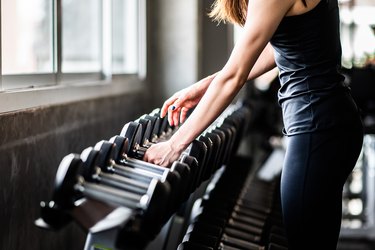
A pop or click in the elbow while curling is often a sign that something is amiss, whether it be elbow instability, arthritis or another type of elbow injury. It's an indication that you may need to seek medical attention and seek the proper treatment before incurring further injuries.
Causes of Elbow Clicking
Video of the Day
Elbow clicking while curling could stem from what's called elbow instability, which includes a variety of disorders that, according to Orthopedic Clinics, range from simple to complex dislocations. Manchester Arm Clinic explains that instability of the elbow joint needs to be treated early to prevent long-term issues.
Video of the Day
Generally, a locking or clicking elbow can be associated with "loose bodies" or arthritis of the elbow. Manchester Arm Clinic describes "loose bodies" as parts of the elbow cartilage lining the joint that dislodge and float in the joint. In specific positions, such as an arm extension, the joint may lock or click. Some of the symptoms resemble tennis elbow and may require an x-ray or scan to detect the difference.
Read more: Elbow Cracks From Working Out
Arthritis of the Elbow
A common type of arthritis in the elbow is rheumatoid arthritis, in which the joint space narrows as the joint lining swells. According to Cedars-Sinai, the disease slowly erodes the bones and soft tissues. Then there's osteoarthritis, which destroys the cartilage at the ends of bones, causing the bones to rub against each other.
Elbow arthritis symptoms can include pain, swelling and stiffness, as well as locking — when your elbow joint catches or locks, lack of full movement — which occurs when you cannot fully extend or flex your elbow — and instability, which is when the joint is not stable, often due to dislocation.
Elbow Treatment and Prevention
If your elbow pops when straightened on a regular basis, or clicks whenever you work out, it's time to consider certain treatments and prevention methods. In terms of prevention, Better Health Channel recommends:
- Always warming up or cooling down after playing a sport
- Using the proper technique and equipment during exercise
- Keeping work tasks that strain the forearm muscles to a minimum
- Doing strengthening exercises
For treatment, specifically related to arthritis, Cedars-Sinai recommends a list of surgical and nonsurgical methods. Nonsurgical methods include:
- Slowing down and resting. Cutting back on activity can relieve joint stress
- Managing pain with acetaminophen or ibuprofen, which can provide short-term pain relief
- Physical therapy, gentle exercises or applying heat or ice to your elbow
For more severe cases of arthritis, more invasive treatments may be necessary. Surgical treatments include:
- Arthroscopy: A surgeon uses a pencil-thin device to make two or three small incisions in the elbow and removes bone spurs, loose fragments and a portion of the diseased synovium.
- Arthroplasty: This surgery requires a joint replacement with an artificial joint.
- Synovectomy: This procedure is often performed in the early stages of rheumatoid arthritis and is when a portion of the bone is removed, so you can have a greater range of motion.
- Osteotomy: A surgeon removes part of the bone to relieve joint strain.